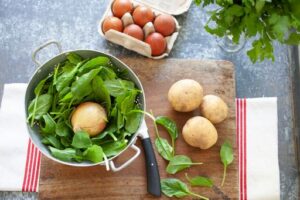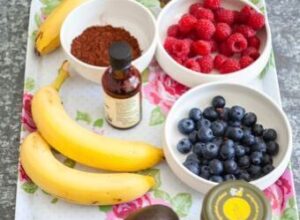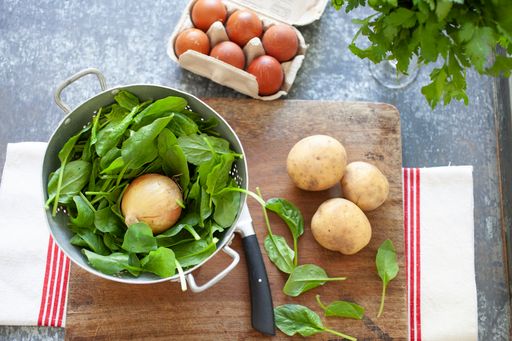Top Tips on Cooking for a Healthy Gut from Dr Joan Ransley
It’s Love Your Gut Week 2021 we are joined by Dr Joan Ransley, in addition to her creating some delicious new recipes , she is also sharing her top tips on cooking for a healthy digestive system for Love Your Gut Week. From why your freezer is your best friend, to the benefits of berries and the power of plants, Joan’s tips will help you give your gut the love it deserves! Happy Love Your Gut Week 2021!
Use your freezer
Your freezer is your best friend when time is short, and you have to put healthy, gut friendly meals on the table. Frozen beans, peas, sweetcorn, and spinach are all good for the health of the gut. They can be taken out of the freezer in the quantities needed and included in dishes such as omelettes, frittatas, stir fries, risottos, casseroles and pies, or eaten as a side dish.
Canned Chickpeas
Canned chickpeas are good for gut health, thanks to the fibre they contain, and make a great snack.
- Heat a thin layer of olive oil in a pan.
- Add drained chickpeas and fry until crisp – approx.10 mins.
- Sprinkle over some smoked paprika or ground cumin to add flavour to the crispy chickpeas.
- The same method can be used to crisp up canned Puy lentils.
These crispy pulses can be strewn over salads, curries and vegetable dishes to add texture and flavour.
Cooking for someone with gut health issues
Cooking for somebody who may have gut health issues? Then think about the ingredients you’re cooking with, as well as the overall dish. As a starting point offer grilled lean meat or fish, flavoured with herbs such as parsley, chervil or dill, steamed green vegetables, such as spinach, and steamed new potatoes or rice. Avoid serving too much fat which can upset the gut and also avoid basing a meal around pulses or wheat which are high in carbohydrates that can ferment in the gut and trigger symptoms in some people.
Berries
Berries, such as, raspberries, strawberries, blackcurrants and redcurrants are a good option for someone with a troubled gut. They look and taste amazing too! Take inspiration from Scandinavian cuisines where berries are made into simple compotes to eat alongside lightly cooked meat and poached fish. Berries are also great served as a delicious dessert with yogurt or cheese. Berries don’t need added sugar and can be flavoured with crushed cardamom seeds, juniper berries, cinnamon or star anise.
Plant foods
Plant foods are the foundation of a diet which helps support a healthy gut microbiota (the collection of microorganisms living in the gut). Plan meals around vegetables that taste good such as aubergines, peppers, mushrooms and courgettes. Adding small amounts of meat, fish, eggs and cheese to vegetable dishes provides additional protein and adds to their flavour and texture. Recent research demonstrates the importance of a healthy gut microbiome for reducing symptoms of anxiety and depression.
The 30 plant foods a week challenge!
Aim to eat at least 30 different plant foods a week. All minimally processed plant food count towards this target. Anything from a clove of garlic to some nuts or seeds. Challenge each member of the family to count the number of plant foods they have eaten in a week. You may be surprised by how well everyone does. The reason why eating a wide variety of plants is important is it improves the diversity of the gut microbiota. A healthy and diverse gut microbiota may have positive effects on the ‘gut-brain axis’ including reducing anxiety.
Whole grains
Whole grains can help keep the gut healthy as they contain soluble and insoluble dietary fibres and a range of bioactive phytochemicals which can improve health due to their antioxidant, anticarcinogenic, antimicrobial, antimutagenic, and anti-inflammatory activities. These important bioactive phytochemicals are mainly present in the outer layers of the grains. Examples of whole grains are: whole wheat and spelt, brown and wild rice, barley, maize (corn), rye, millet, oats, buckwheat, quinoa and ‘ancient grains’ e.g. kamut, freekah, amaranth.
Oily fish
Long chain omega three fatty acids are good for the health of the gut and can be found in oily fish such as sardines, fresh tuna, mackerel and salmon. Sardines taste great on rye sourdough toast with a squeeze of lemon and some black pepper. Fresh tuna is expensive, but you need less than 50g per person to include in noodle dishes and salads. Both smoked and fresh salmon are great to eat in salads and with fresh vegetables. Aim to eat one portion of oily fish a week.
Use it all
Use as much of the whole vegetable as you can. When using spring onions, use the white and green parts. Use broccoli and cauliflower stalks in soups which are going to be liquidised. Steamed beetroot leaves are delicious as a side dish, or use the outer leaves of cabbages, kale and sprouts to make crisps. Roughly tear the leaves to the size of a crisp, place in a bowl with a little olive oil and a little garlic powder and parmesan cheese and mix well. Lay the dressed torn leaves on a baking sheet and place in a preheated oven [220°C/Gas 7]. Cook for 5 minutes until crisp and just beginning to brown.


For the latest on Love Your Gut Week 2021 see Facebook – @LoveYourGutOnline, Twitter – @loveyourgut and www.loveyourgut.com

